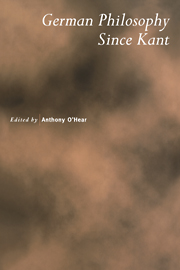Book contents
- Frontmatter
- Contents
- Preface
- Notes on Contributors
- Fichte and Schelling
- Hegel's Critique of Foundationalism in the ‘Doctrine of Essence’
- Schopenhauer's Pessimism
- Karl Marx
- Nietzsche's Virtues: A Personal Inquiry
- Bolzano, Brentano and Meinong: Three Austrian Realists
- Vorsprung durch Logik: The German Analytic Tradition
- German Philosophy of Mathematics from Gauss to Hilbert
- The Revolution of Moore and Russell: A Very British Coup?
- Husserl's Concept of Being: From Phenomenology to Metaphysics
- Frege and the Later Wittgenstein
- Otto Neurath, the Vienna Circle and the Austrian Tradition
- Does the Nothing Noth?
- Reactionary Modernism
- Adorno on Disenchantment: The Scepticism of Enlightened Reason
- Habermas, Science and Modernity
- German Philosophy Today: Between Idealism, Romanticism, and Pragmatism
- The Career of Aesthetics in German Thinking
- Hermeneutic and Analytic Philosophy. Two Complementary Versions of the Linguistic Turn?
- Index of Names
Otto Neurath, the Vienna Circle and the Austrian Tradition
Published online by Cambridge University Press: 29 September 2009
- Frontmatter
- Contents
- Preface
- Notes on Contributors
- Fichte and Schelling
- Hegel's Critique of Foundationalism in the ‘Doctrine of Essence’
- Schopenhauer's Pessimism
- Karl Marx
- Nietzsche's Virtues: A Personal Inquiry
- Bolzano, Brentano and Meinong: Three Austrian Realists
- Vorsprung durch Logik: The German Analytic Tradition
- German Philosophy of Mathematics from Gauss to Hilbert
- The Revolution of Moore and Russell: A Very British Coup?
- Husserl's Concept of Being: From Phenomenology to Metaphysics
- Frege and the Later Wittgenstein
- Otto Neurath, the Vienna Circle and the Austrian Tradition
- Does the Nothing Noth?
- Reactionary Modernism
- Adorno on Disenchantment: The Scepticism of Enlightened Reason
- Habermas, Science and Modernity
- German Philosophy Today: Between Idealism, Romanticism, and Pragmatism
- The Career of Aesthetics in German Thinking
- Hermeneutic and Analytic Philosophy. Two Complementary Versions of the Linguistic Turn?
- Index of Names
Summary
It is one of the distinctive claims of Neurath, though not of the Vienna Circle generally, that the Vienna Circle's philosophy was not really German philosophy at all. The relation is, if Neurath is to be trusted, anything but straight-forward. To understand it, not only must some effort be expended on specifying Neurath's claim, but also on delineating the different party-lines within the Vienna Circle.
Some might, of course, be tempted to dismiss the claim as just another cranky idea of the enfant terrible of logical empiricism, but I shall not do so. Neurath's admittedly problematic claim is too important to dismiss. My thesis here is that Neurath's claim holds the key for recovering, as it were, Neurath's Vienna Circle. Developing this thesis in turn helps, first, to deepen the appreciation of the heterogeneity of the Vienna Circle and, second, to provide a valuable vantage point on the pre-history of the Vienna Circle. Moreover, it provides an example of the multi-layered historicity of early analytic philosophy. The philosophy of the Vienna Circle was neither simply a logicised version of British empiricism nor even just an admixture of that and Neokantian elements: still other influences need to be recognised.
In place of detailed excavation, which will be provided elsewhere, I am concerned to bring out the more general interest that my thesis possesses.
- Type
- Chapter
- Information
- German Philosophy since Kant , pp. 249 - 270Publisher: Cambridge University PressPrint publication year: 1999
- 4
- Cited by

